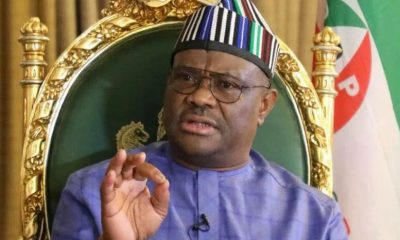Economy
FG Targets N553bn From Unremitted Shipping Taxes

The Federal Government says it intends to recoup over N553 billion unremitted taxes from international petroleum shipping companies operating in Nigeria.
The Director, International Tax, Federal Inland Revenue Service (FIRS), Mr Abdullahi Aliyu, said that recouping the sum which accrued from 2010 to 2019 would help address the nation’s budget deficits.
Aliyu said with the country’s overall budget deficit of N11.
34 trillion, the N553 billion unremitted taxes represents 5.03 per cent and would be an alternative to addressing Nigeria’s economic woes instead of borrowing.He said this while speaking at a virtual summit organised by the Nigerian Chamber of Shipping (NCS) on Wednesday with the theme; “Sensitising the Nigerian Maritime Industry on the New Tax Policy and Objectives”.
Aliyu, however, noted that shipping companies involved in dry cargo activities in Nigeria and foreign airlines had been complying with the tax laws that most operators in the oil sector had neglected.
“The onus is on global businesses to understand the local laws and taxation in the countries where they transact business, and these specific laws have been in place in the nation for decades.
“Nigerian taxes are more favourable to non-residents compared to indigenous companies, thereby creating an unfair business environment for local operators,” he said.
In his paper presentation, the Assistant Director, Tax, FIRS, Mr Oluwole Oni, pointed out that the agency had advertised the planned taxation exercise in December 2021 to prevent disruptions in the essential global shipping business.
“Non-resident vessels earn freight income from transportation services provided in transporting petroleum products (crude oil and gas products) from Nigeria to the agreed location, outside of Nigeria.
“Irrespective of the commercial arrangement adopted by the non-resident vessels to lift crude oil from Nigeria, freight income attributable to Nigeria is taxable in line with the Companies Income Tax Act (CITA),” he said.
Oni said that the FIRS had written officially to operators who owed taxes for the period between 2010 and 2019, adding that the companies were expected to send in their responses within 30 days.
“Those who received the letters are expected to send in their responses which aren’t only about payment. The response can be an acknowledgement of receipt, a demand for clarification, payment.
“The first step to compliance is registration with FIRS and most operators are yet to register,” Oni said.
The Senior Advisor for Shipping Policy at the ICS, Georgia Spencer-Rowland, stated that communication on tax regime was not properly carried out as most members of ICS were oblivious of tax framework.
She noted that members of ICS comprised over 80 per cent of the world’s merchant ships and 40 national ship-owners associations.
Oni, however, encouraged FIRS to clearly communicate in an official document, the period allotted as grace period for the tax implementation.
“Do these taxes affect inbound or outbound ships? Are the taxes payables on freight, income or profits?
“Will ICS members as stakeholders be allowed to participate in the Presidential Technical Committee ahead of the implementation of these taxes?” Georgia asked.
Meanwhile, the Legal Counsel to INTERTANKO, Ms Selena Challacombe, said that the figures and volumes quoted by FIRS for taxation were not the actual figures in the transactions carried out by INTERTANKO members.
Challacombe said that there could be challenges in recouping taxes with the figures for 2010 to 2019 as ship charterers are unlikely to provide the vital information seen as germane to their businesses.
She said the situation should not be termed tax evasion when the alleged violators had not profited from the negligence of taxes they never knew existed.
She added that Australia had a similar law enacted since 1936 and members of INTERTANKO factored in the taxes when undertaking contracts for Australia.
In his welcome remarks, the President of NCS, Mr Aminu Umar, stressed the need for collaboration among stakeholders and government agencies for a smooth implementation of taxation.
Umar said the chamber was willing to partner with government to collect revenue for national sustainability, adding that there must be collective input to rightly shape the shipping sector and encourage investments.
He described the Presidential Technical Committee for the implementation of taxation as an ideal avenue for collaborations between local and global shipping operators and government agencies to advance the nation’s maritime sector.
FIRS draws its legal backing from Section 14(1) of the Companies Income Tax Act (CITA), titled “Companies engaged in shipping or air transport”.
The act states: “Where a company other than a Nigerian company carries on the business of transport by sea or air, and any ship or aircraft owned or chartered by it calls at any port or airport in Nigeria, its profit or loss to be deemed to be derived from Nigeria shall be the full profits or loss arising from the carriage of passengers, mails, livestock or goods shipped or loaded into an aircraft in Nigeria”.
Stakeholders at the summit, the International Association of Independent Tanker Owners (INTERTANKO), ICS, indigenous ship-owners, tax experts, among others called for more clarity and time for operators to understand the Nigerian tax regime.
The global bodies also claimed that their members were not aware of the tax provisions and public notice given by FIRS, and expressed fears on Nigeria’s insistence on recouping taxes on previous transactions between 2010 and 2019.
Other dignitaries at the summit included the President of Ship Owners Association of Nigeria (SOAN), Dr Mkgeorge Onyung; Vice President of NCS, Ify Akerele; President, Nigerian Shipowners Association (NISA), Mr Sola Adewumi; among others. (NAN)
Economy
We’ll Continue Borrowing Within Sustainable Limits- FG

The Federal Government says it will continue to borrow within manageable and sustainable limits in accordance with the Debt Management Office (DMO) debt sustainability framework.
This is contained in a statement by the Director, Information and Public Relations in the Ministry of Finance, Mr Mohammed Manga, in Abuja on Wednesday.
President Bola Tinubu recently requested the approval of the 2024 – 2026 external borrowing rolling plan from the National Assembly.
Tinubu has requested the National Assembly’s approval to secure external loans of 21.5 million dollars and 15 billion Yuan, along with a grant of 65 million Euro, as part of the federal government’s proposed 2025–2026 external borrowing plan.
Manga said that the proposed borrowing plan was an essential component of the Medium-Term Expenditure Framework (MTEF) in accordance with both the Fiscal Responsibility Act 2007 and the DMO Act 2003.
“The plan outlines the external borrowing framework for both the federal and sub-national governments over a three-year period, accompanied by five detailed appendices on the projects, terms and conditions, implementation period, etc.
“By adopting a structured, forward-looking approach, the plan facilitates comprehensive financial planning and avoids the inefficiencies of ad-hoc or reactive borrowing practices.
“This strategic method enhances the country’s ability to implement effective fiscal policies and mobilise development resources,” he said.
According to the statement, the borrowing plan does not equate to actual borrowing for the period.
“The actual borrowing for each year is contained in the annual budget. In 2025, the external borrowing component is 1.23 billion dollars, and it has not yet been drawn.
“This is planned for H2 2025, the plan is for both federal and several state governments across numerous geopolitical zones including Abia, Bauchi, Borno, Gombe, Kaduna, Lagos, Niger, Oyo, Sokoto, and Yobe States.
“Importantly, it should be noted that the borrowing rolling plan does not equate to an automatic increase in the nation’s debt burden.
“The nature of the rolling plan means that borrowings are split over the period of the projects, for example, a large proportion of projects in the 2024–2026 rolling plan have multi-year drawdowns of between five to seven years which are project-tied loans,” Manga said.
He said that these projects cut across critical sectors of the economy, including power grids and transmission lines, irrigation for improving food security, fibre optics network across the country, fighter jets for security, rail and road infrastructure.
According to him, the majority of the proposed borrowing will be sourced from the country’s development partners, like the World Bank, African Development Bank, French Development Agency, European Investment Bank, JICA, China EximBank, and the Islamic Development Bank.
Manga said that these institutions offer concessional financing with favourable terms and long repayment periods, thereby supporting Nigeria’s development objectives sustainably.
He said that the government seeks to reiterate that the debt service to revenue ratio has started decreasing from its peak of over 90 per cent in 2023.
Manga said that the government has ended the distortionary and inflationary ways and means.
According to him, there is significant revenue expectations from the Nigerian National Petroleum Corporation Limited (NNPC Ltd), technology-enabled monitoring and collection of surpluses from government owned enterprises and revenue-generating ministries, departments, and agencies and legacy outstanding dues.
“Having achieved a fair degree of macroeconomic stabilisation, the overarching goal of the federal government is to pivot the economy onto a path of rapid, sustained, and inclusive economic growth.
“Achieving this vision requires substantial investment in critical sectors such as transportation, energy, infrastructure, and agriculture.
“These investments will lay the groundwork for long-term economic diversification and encourage private sector participation.
“Our debt strategy is therefore guided not solely by the size of our obligations, but by the utility, sustainability, and economic returns of the borrowing,” he said.(NAN)
The Federal Government says it will continue to borrow within manageable and sustainable limits in accordance with the Debt Management Office (DMO) debt sustainability framework.
This is contained in a statement by the Director, Information and Public Relations in the Ministry of Finance, Mr Mohammed Manga, in Abuja on Wednesday.
President Bola Tinubu recently requested the approval of the 2024 – 2026 external borrowing rolling plan from the National Assembly.
Tinubu has requested the National Assembly’s approval to secure external loans of 21.5 million dollars and 15 billion Yuan, along with a grant of 65 million Euro, as part of the federal government’s proposed 2025–2026 external borrowing plan.
Manga said that the proposed borrowing plan was an essential component of the Medium-Term Expenditure Framework (MTEF) in accordance with both the Fiscal Responsibility Act 2007 and the DMO Act 2003.
“The plan outlines the external borrowing framework for both the federal and sub-national governments over a three-year period, accompanied by five detailed appendices on the projects, terms and conditions, implementation period, etc.
“By adopting a structured, forward-looking approach, the plan facilitates comprehensive financial planning and avoids the inefficiencies of ad-hoc or reactive borrowing practices.
“This strategic method enhances the country’s ability to implement effective fiscal policies and mobilise development resources,” he said.
According to the statement, the borrowing plan does not equate to actual borrowing for the period.
“The actual borrowing for each year is contained in the annual budget. In 2025, the external borrowing component is 1.23 billion dollars, and it has not yet been drawn.
“This is planned for H2 2025, the plan is for both federal and several state governments across numerous geopolitical zones including Abia, Bauchi, Borno, Gombe, Kaduna, Lagos, Niger, Oyo, Sokoto, and Yobe States.
“Importantly, it should be noted that the borrowing rolling plan does not equate to an automatic increase in the nation’s debt burden.
“The nature of the rolling plan means that borrowings are split over the period of the projects, for example, a large proportion of projects in the 2024–2026 rolling plan have multi-year drawdowns of between five to seven years which are project-tied loans,” Manga said.
He said that these projects cut across critical sectors of the economy, including power grids and transmission lines, irrigation for improving food security, fibre optics network across the country, fighter jets for security, rail and road infrastructure.
According to him, the majority of the proposed borrowing will be sourced from the country’s development partners, like the World Bank, African Development Bank, French Development Agency, European Investment Bank, JICA, China EximBank, and the Islamic Development Bank.
Manga said that these institutions offer concessional financing with favourable terms and long repayment periods, thereby supporting Nigeria’s development objectives sustainably.
He said that the government seeks to reiterate that the debt service to revenue ratio has started decreasing from its peak of over 90 per cent in 2023.
Manga said that the government has ended the distortionary and inflationary ways and means.
According to him, there is significant revenue expectations from the Nigerian National Petroleum Corporation Limited (NNPC Ltd), technology-enabled monitoring and collection of surpluses from government owned enterprises and revenue-generating ministries, departments, and agencies and legacy outstanding dues.
“Having achieved a fair degree of macroeconomic stabilisation, the overarching goal of the federal government is to pivot the economy onto a path of rapid, sustained, and inclusive economic growth.
“Achieving this vision requires substantial investment in critical sectors such as transportation, energy, infrastructure, and agriculture.
“These investments will lay the groundwork for long-term economic diversification and encourage private sector participation.
“Our debt strategy is therefore guided not solely by the size of our obligations, but by the utility, sustainability, and economic returns of the borrowing,” he said.(NAN)
Economy
Organise Informal Sector, Tax Prosperity Not Poverty, Adedeji Tasks Officials

The Chairman, Joint Tax Board (JTB), Dr Zacch Adedeji, has urged officials of the board to organise traders and artisans into a formal body before capturing them in the tax net.
Adedeji said that this was in line with the agenda of President Bola Tinubu not to tax poverty but prosperity.
The chairman stated this at the 157th Joint Tax Board meeting held in Ibadan, on Monday.
The theme of the meeting “Taxation of the Informal Sector: Potentials and Challenges”.
Speaking on the theme of the event, Adedeji stressed the need to evolve a system that would make the informal sector formal before it could be taxed.
Adedeji, who also doubles as the Chairman, Federal Inland Revenue Service, (FIRS), said “What I would not expect from the JTB meeting is to define a system that would tax the informal sector.
“The only thing is to formalize the informal sector, not to design a system on how to collect tax from market men and women.
“As revenue administrator, our goal is to organise the informal sector so that it can fit into existing tax law.”
Citing a report of the National Bureau of Statistics (NBS) in the first quarter of 2023, the chairman said that the nation’s unemployment index was attributable to recognised informal work.
Adedeji stated that workers in that sector accounted for 92.6 per cent of the employed population in the country as at Q1 2023.
“JTB IS transiting to the Joint Revenue Board with expanded scope and functions.
“We are hopeful that by the time we hold the next meeting of the Board, the Joint Revenue Board (Establishment) Bill would have been signed into Law by the President.
“The meetings of the board provide the platform for members to engage and brainstorm on contemporary and emerging issues on tax, and taxation,” he said.
In his address, Gov. Seyi Makinde of Oyo State, said the theme of the meeting was apt and timely, stressing that it coincides with the agenda of the state to improve on its internally generated revenue.
According to him, the meeting should find the best way forward in addressing the issue of the informal sector and balance the identified challenges.
“Nigeria is rich in natural resources, but it is a poor country because economic prosperity does not base on natural resources,”
Makinde also said that knowledge, skill and intensive production were required for economic prosperity, not just the availability of natural resources.
He stressed the need to move from expecting Federal Allocations to generating income internally.
“We are actively ensuring that people are productive and moving the revenue base forward,” Makinde said.
The governor said that tax drive should be done by simplifying tax processes, incentives for compliance like access to empowerment schemes and loans.
He urged JTB to deepen partnership and innovation in using data on tax to track and administer it.
Earlier, the Executive Chairman, Oyo State Board of Internal Revenue, Mr Olufemi Awakan, said the meeting was to address tax-related matters, evolve a workable, effective and
efficient tax system across the states and at the Federal level.
He urged participants to find amicable solutions to challenges of tax jurisdiction, among others.
Tax administrators from all the 36 states of the federation, who are members of JTB, were in attendance. (NAN)
Economy
Customs Zone D Seizes Contraband Worth N110m

The Nigeria Customs Service (NCS), Federal Operation Unit (FOU), Zone D, has seized smuggled goods worth over N110 million between April 20 till date.
The Comptroller of Customs, Abubakar Umar, said this at a news conference on Tuesday in Bauchi.
He listed the seized items to include 11,200 litres of petrol; 192 bales of second hand clothing, 140 cartons of pasta, 125 pairs of jungle boots, 47 bags of foreign parboiled rice and 9.
40 kilogramme of pangolin scales.Umar said the items were seized through increased patrols, intelligence-led operations, and strengthened inter-agency collaboration.
The comptroller said the pangolin scales would be handed over to the National Environmental Standards and Regulations Enforcement Agency (NESREA) for appropriate action, while the seized petrol would be auctioned, and the proceeds remitted to the federation account.
He attributed the decrease in smuggling activities of wildlife, narcotics, and fuel to the dedication and professionalism displayed by the personnel in line with Sections 226 and 245 of the NCS Act 2023.
The comptroller enjoined traders to remain law abiding, adding the service would scale up sensitisation activities to combat smuggling.
“We remain resolute in securing the borders and contributing to Nigeria’s economic development,” he said.
The FOU Zone D comprises Adamawa; Taraba, Bauchi, Gombe, Borno, Yobe, Plateau, Benue and Nasarawa. (NAN)





















